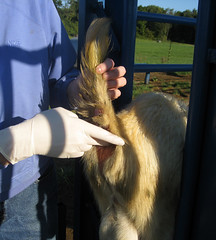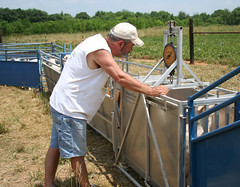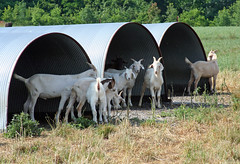 We are currently working on the protocol and guidelines for the 2008 Western Maryland Pasture-Based Meat Goat Performance Test, to be held June 7 - October 4, 2008, at the University of Maryland's Western Maryland Research & Education Center (WMREC) in Keedysville, MD (9 miles south of Hagerstown).
We are currently working on the protocol and guidelines for the 2008 Western Maryland Pasture-Based Meat Goat Performance Test, to be held June 7 - October 4, 2008, at the University of Maryland's Western Maryland Research & Education Center (WMREC) in Keedysville, MD (9 miles south of Hagerstown).Eligibility requirements will be virtually the same as last year. The test is open to any male goat, of any breed or breed cross, between approximately 3 and 5 months of age (as of 6/7) that weighs at least 35 lbs. Producers may consign up to five goats to the test. At least two per consigner is recommended. Up to 50 goats will be accepted for the test. Preference will be given to Maryland producers and previous consigners.
While on test, the goats will consume a pasture-only diet, with free choice minerals. The goats will be worked every 2 weeks to determine weight, FAMACHA© and body condition scores. As compared to previous years, fecal samples will collected more frequently at day 0, 14, 28, 42, and 56. Fecal egg counts will be determined for each individual goat using the modified McMaster technique. A pooled fecal sample will be hatched to determine egg types. Under normal fecal analysis, the different stomach worm eggs cannot be differentiated. We are seeking a greater understanding of internal parasitism in goats and the genetic differences between individual.
Carcass characteristics will be estimated on all goats using realtime ultrasound. Each producer may select two goats for collection of slaughter data. This is new for 2008. We are still working out the details on this aspect of the test.
 The top 20 performing bucks, based on performance ratios and minimum standards for reproductive soundness and structural correctness, will be eligible to sell at auction. The first Western Maryland Pasture-Based Performance Tested Buck Sale and Invitational Doe Kid Sale will be held on October 4, 2008, at the Washington County Agricultural Education Center (property is adjacent to the test site).
The top 20 performing bucks, based on performance ratios and minimum standards for reproductive soundness and structural correctness, will be eligible to sell at auction. The first Western Maryland Pasture-Based Performance Tested Buck Sale and Invitational Doe Kid Sale will be held on October 4, 2008, at the Washington County Agricultural Education Center (property is adjacent to the test site).We have yet to determine the criteria for consignments to the doe sale, only that sale consignments will be limited to the producers who consign male goats to the performance test. The does will require performance data and must meet minimum standards for reproductive soundness and structual correctness.
The nomination period for the goat test is April 1 - May 15. There will be a nomination fee of $20 per goat. An additional $55 per goat will be due on June 7. Nominations of does for the sale will be later.
 The Western Maryland Pasture-Based Meat Goat Performance Test is sponsored by University of Maryland Cooperative Extension (MCE). The test committee consists of Susan Schoenian (MCE), Jeff Semler (MCE), Willie Lantz (MCE), Jeanne Dietz-Band, Mary Beth Bennett (WVU), Dr. Dahlia Jackson (DSU), and Dr. Niki Whitley (UMES/MCE). Dr. Kevin Pelzer (VMRCVM) serves as our veterinary advisor. Cindy Mason (MCE) and Pam Thomas (MCE) provide administrative support.
The Western Maryland Pasture-Based Meat Goat Performance Test is sponsored by University of Maryland Cooperative Extension (MCE). The test committee consists of Susan Schoenian (MCE), Jeff Semler (MCE), Willie Lantz (MCE), Jeanne Dietz-Band, Mary Beth Bennett (WVU), Dr. Dahlia Jackson (DSU), and Dr. Niki Whitley (UMES/MCE). Dr. Kevin Pelzer (VMRCVM) serves as our veterinary advisor. Cindy Mason (MCE) and Pam Thomas (MCE) provide administrative support.Please direct questions about the test to Susan Schoenian at (301) 432-2767 x343 or sschoen@umd.edu.











